It makes me sad how misunderstood Undertale is, even within its own fandom.
Since the release of Deltarune, I think it has lessened, but for a time many people knew Undertale for its edgiest aspects, primarily the infamous genocide route. Undertale is marketed as "The friendly RPG where no one has to die," but if you choose you can ignore this, instead killing everyone you see and resulting in an incredibly difficult surprise boss fight. A large amount of fan content revolves around this evil route, especially that boss. However, despite the focus people tend to put on it, this portion of the game is not something most players will even think about experiencing, and serves as a complete antithesis to Undertale as a whole.
Undertale is a game about love.

Platonic, romantic, familial, love for people, love for things, Undertale is a game that asks you to simply care about those around you. Cherish what you have, and strive to improve your future.
Throughout your travels in the Underground, a massive cavern where all monsters were banished long ago, you meet many different characters, all with their different little personality quirks. Most of them start out trying to kill you, but as you continue to encounter them you discover that their motivations are much more complex. Very few actually want to kill you. The relationships you have with these characters are what truly defines this game.
In the Ruins, the tutorial section of the game, you meet a goat woman named Toriel. She takes you in like a mother, and teaches you to explore this new world you've literally fallen into. She cares deeply about you, to a fault. When you insist on leaving, wanting to escape the underground rather than choose to live there permanently, she is unable to let you go.
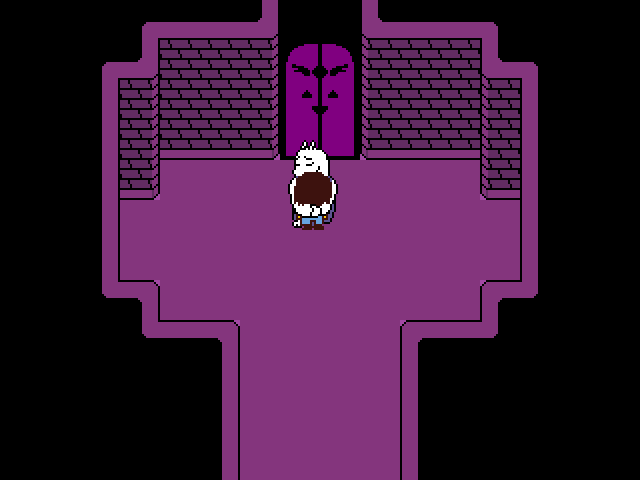
After you leave the ruins, you meet the iconic duo of the game: skeleton brothers named Sans and Papyrus. Sans is laid back, constantly cracking jokes, and knows you're a human but doesn't really seem to care much about it. Sometimes he feels like he knows more than he lets on. Papyrus, on the other hand, is incredibly energetic, and is determined to capture a human and join the royal guard. However, he is also deeply innocent and kind, and seems to be always trying to make sure his encounters with you are fair, even when the end result is that he gives you an incredibly easy puzzle and hurts himself in some slapstick way. Sans is constantly annoying Papyrus with his puns and other practical jokes, but the two really sincerely care for each other.
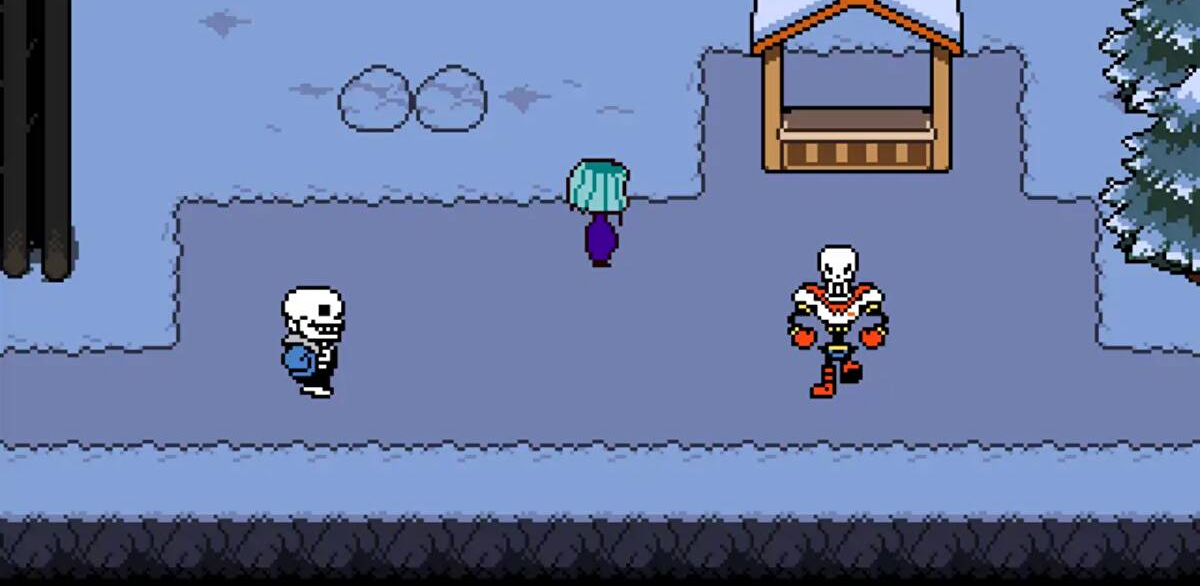
In Waterfall, you meet the first character to really genuinely antagonize you throughout an area: Undyne. She is the head of the royal guard, and she hunts you viciously until you finally meet and properly fight. She is incredibly fierce, and she HATES you. After you get past her, Papyrus brings you to her house to hang out, and convinces her to not kill you when you're there. While her fierceness remains even after she stops trying to do that, you end up learning that she's genuinely a really sweet and fun person. She plays piano, she teaches Papyrus to cook, and she is determined to protect those she loves. She eventually realizes that you're not the horrible person she thought you were.
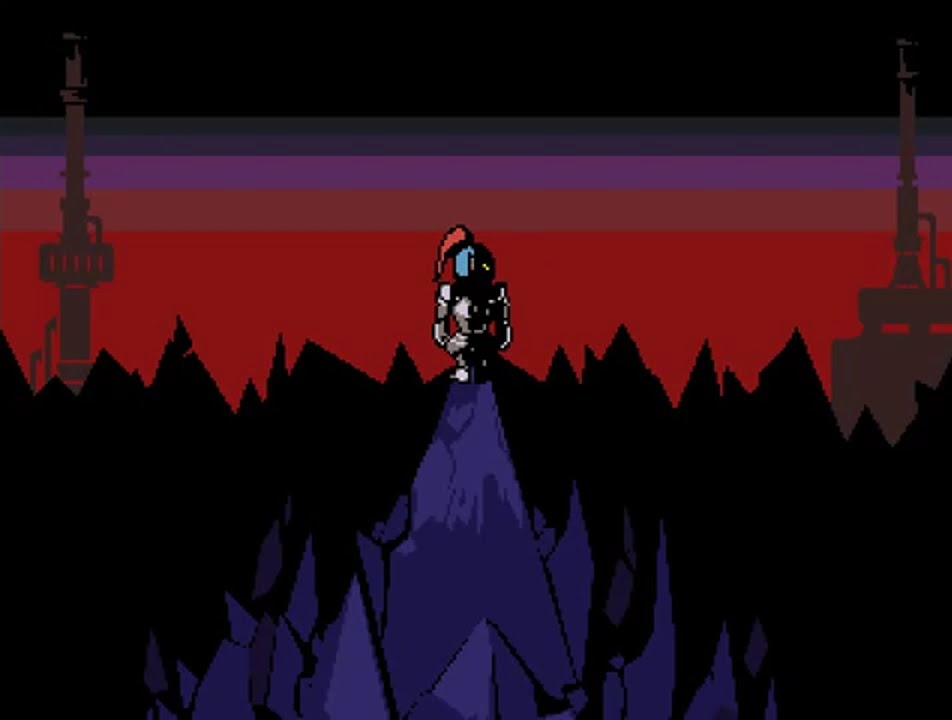
Hotland introduces you to an ally and an antagonist, Alphys and Mettaton. Alphys is a shy scientist who has been watching you for your entire journey, and she is determined to help you navigate the puzzles of the area and return to the surface. She watches anime. She is bisexual. She's chronically online. Her attempts to help you are thwarted both by her own nervousness and social awkwardness and by Mettaton, a robot she built who is the Underground's one and only television star and huge celebrity. He wants to take your soul to go to the surface and become a sensation to humans, and continuously throws you into these bizarre tv show scenarios where you have to do some absurd thing in order to not get killed. He's like gay jigsaw. As you go on, you help Alphys become more confident, and in the end you help Mettaton realize just how much the Underground loves and needs him.
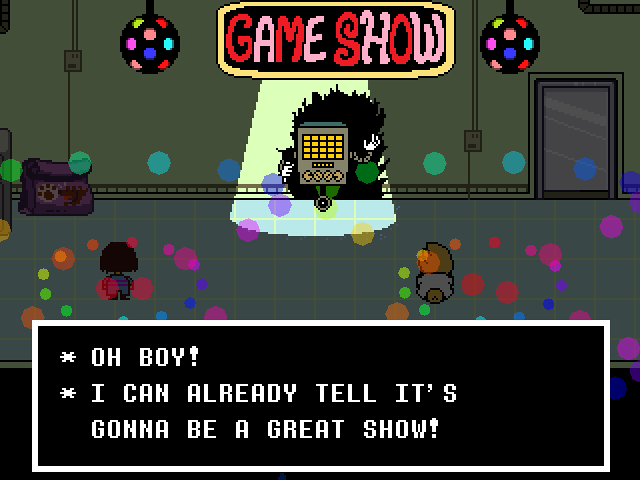
I will not spoil the final section of the game. It almost makes me cry every time I play it.
All of these people become your friends, and it really feels like they're your friends, not just the friends of the human you play as. You grow deeply attached to them. I genuinely wish I could hang out with most of them irl. This isn't even everyone! These characters serve as the main cast, but there are so many more little side characters who are also absolutely lovely and I adore every single one of them.
There's one character I haven't mentioned. The first character you meet, actually. The main antagonist of the game.
Flowey. Flowey the flower.
He's a little yellow flower with a smiley face.
He has killed more people than everyone else in the game combined.
Flowey greets you with a smile when you first fall into the Underground. He introduces himself to you, and explains how to interact with the world. You can increase your LOVE by catching little white "friendliness pellets!" How cute! When you grab a friendliness pellet it damages you. Flowey's smile contorts into an evil grimace and he hisses to you, "You idiot. In this world, it's kill or be killed." Before he can kill you, you are saved by Toriel, but he continues to stalk you throughout the rest of the game, ultimately culminating in something truly horrific. He is the other part of where people get the idea that undertale is "edgy" from.
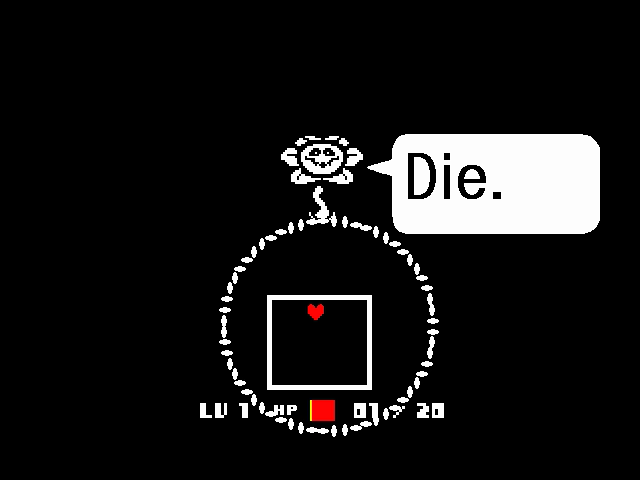
Despite what flowey claims, Undertale is not a game about morality. It is not a deconstruction of video game violence. "Kill or be killed" is not a real choice you have to make. Flowey represents the polar opposite of what the game wants you to take away from it. The true morals of Undertale are perfectly simple.
You have to be kind. Please, be kind.
Everything Everywhere All At Once is a 2022 action comedy drama everything film directed by Daniel Scheinert and Daniel Kwan, collectively known as Daniels. The plot centers on Evelyn Wang, a Chinese-American immigrant who, while being audited by the IRS, discovers that she must connect with parallel universe versions of herself to prevent a powerful being from destroying the multiverse.
This movie, I think, has also been misunderstood by some. Nihilism is a strong focus of the film, and I've heard many people express a distaste for the "optimistic nihilism" it seems to have as its message. But this film is not giving into nihilism. Everything Everywhere All At Once is a complete deconstruction of the idea of nihilism. It is about how truly completely believing that nothing matters will detach you from the people who care about you and the things that should matter to you.
Everything Everywhere All At Once is a movie about love.
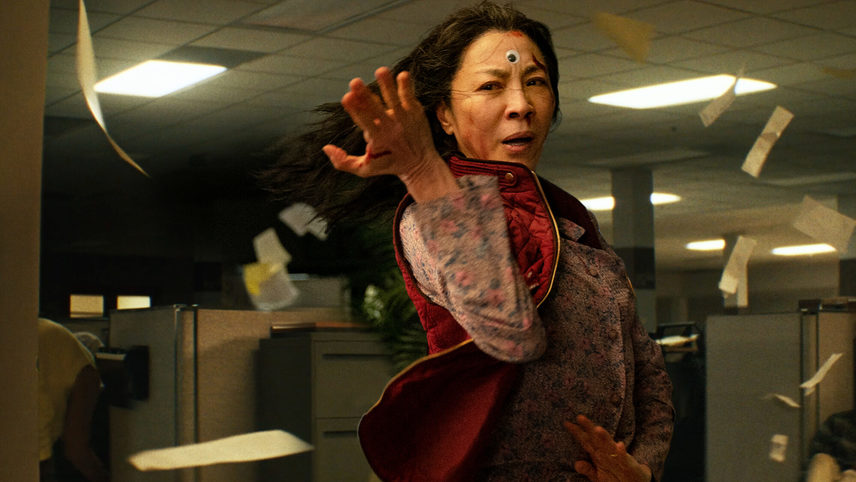
I will be spoiling this movie, by the way.
Evelyn Wang has a lot going on in her life. She is running a failing laundromat, she is being audited by the IRS, she has not yet come to terms with her daughter's sexuality, and she is still desperately trying to please her disapproving father. She is blunt and rude, and all of her family seems in some way annoyed with her. Her husband, Waymond, is planning to divorce her.
When a version of Waymond from an alternate universe (referred to as "Alpha-Waymond") throws her into a ridiculous multiverse adventure, her immediate reaction is to ignore it. Not her problem. Soon, however, she finds that she can't avoid it. She has to face this herself.
The mechanics of multiverse travel function differently here compared to other media most are familiar with. There are no portals or teleporters. To access a parallel world, you take over the body of the you in that world, called "verse-jumping". You can also use this to access the knowledge and abilities of that version of you, allowing you to use it in a different universe. The way you have to do this, in perfect Daniels fashion, is to do something weird and unexpected that you would never do normally.

Evelyn botches this initially, doing the wrong things and ending up accessing and being unable to get away from unintended alternate universes. Later in the movie, she decides to use this chaos to her advantage, using every universe she can access to get the ultimate advantage.
The first universe she accesses intentionally is one where she knows kung-fu. Seems like just a fun little thing, but there is one extremely important difference in this universe: here, she broke up with Waymond, and stayed in China. After first accessing the universe and using the ability gained from it to defeat Jamie Lee Curtis, she tells Waymond "I saw my life without you... it was beautiful..."
Not exactly the kind of thing that's nice to hear from your wife. Evelyn is still the same selfish person she was before.
The cause of all the multiverse travel that Alpha-Waymond needs her help to stop is the next major revelation. Jobu Tupaki, A being existing in every universe at once, capable of bending reality to her own will.
...it's an alternate version of her daughter, Joy.
Evelyn immediately determines this malevolent force to be the cause of all of her Joy's problems. If she defeats Jobu Tupaki, everything will go back to normal, her daughter will stop avoiding her, they'll be a happy family again, and she'll... uh... stop being gay. Evelyn isn't entirely on board with the whole LGBT thing yet. She approaches this problem from the perspective of your typical action or superhero flick, kick the big bad evil guy's ass and all the bad stuff goes away and the day is saved! This isn't how it works. She can't be stopped through violence. Furthermore, Jobu Tupaki is not some evil spirit possessing her daughter. Her and Joy are one and the same.
Eventually Evelyn confronts Jobu, and learns her motivation. Pure nihilism. Nothing matters. She has determined that everything is meaningless and entropy will eventually consume us all and in the grand scheme of things why even fucking bother. It's all meaningless. All she wants anymore is for someone to understand her, see the world how she does. Eventually, she succeeds. Evelyn is convinced, and begins a destructive downward spiral as she stops caring about everyone and everything around her.
In Undertale, this is Flowey's point of view. The save and load mechanics of the game are things that actually exist in the universe, and before you came, Flowey was the one with that power. He has seen every possible combination of events in the underground. He has done everything, seen everyone... killed everyone. He's completely jaded by it. The people of the underground aren't people with thoughts and emotions to him. They're variables. Code. He has become completely apathetic.
At the lowest point of the movie for every character, as Evelyn is deep in her state of nihilism, Waymond comes in. He's scared, he's hurt, he doesn't know what's happening, but he wants things to be made right. We go back to the kung-fu universe. Waymond and Evelyn are talking in an alley, in a scene almost directly ripped from In The Mood For Love.
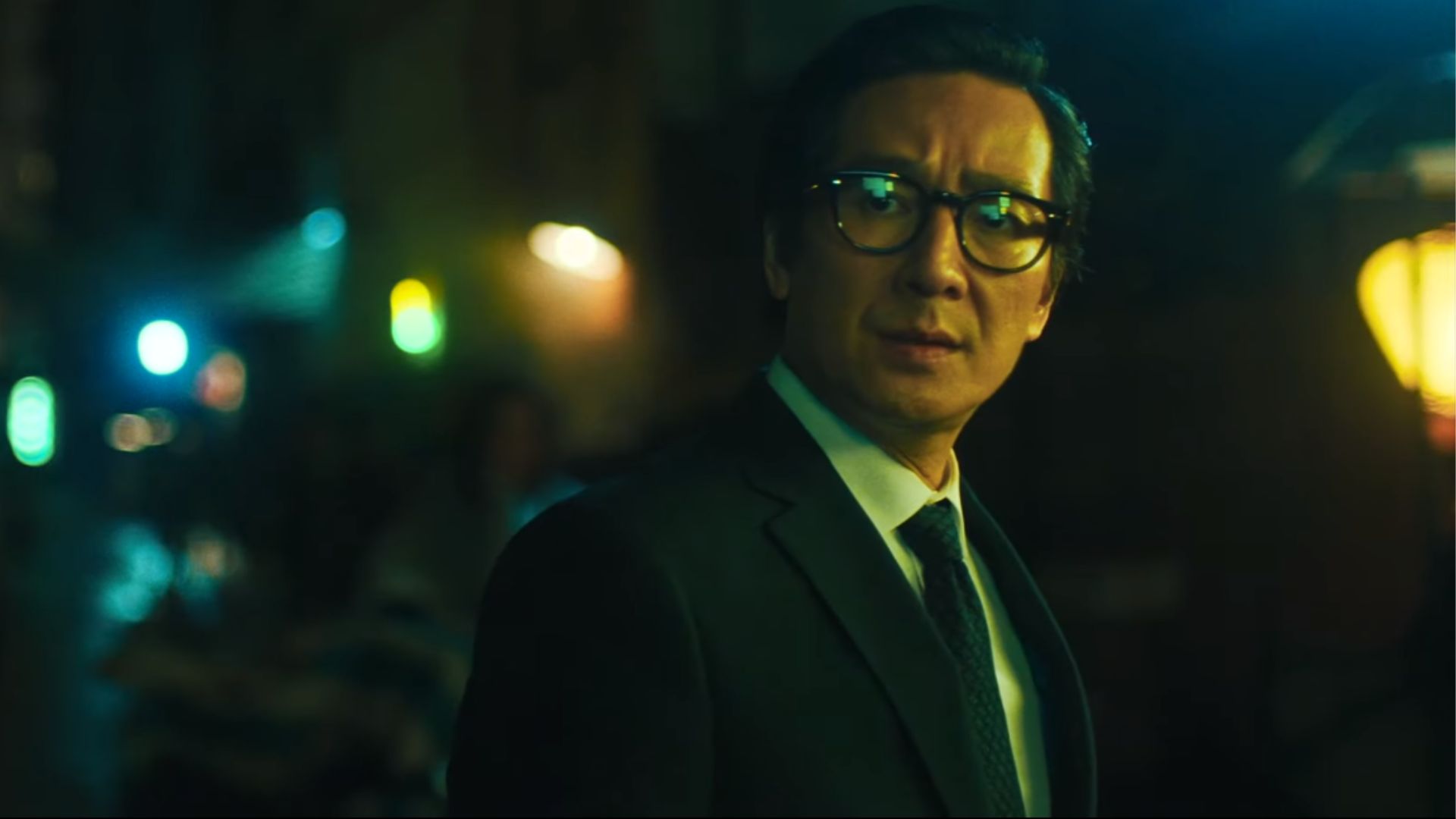
"You think I'm weak, don't you?" he asks. "All of those years ago when we first fell in love... your father would say I was too sweet for my own good. Maybe he was right."
Back to the main universe, our Waymond starts talking to the many other verse-jumpers surrounding them. Dialogue shifts between the two worlds. "Please! Please! Can we... can we just stop fighting?"
"You tell me it's a cruel world... and we're all running around in circles. I know that. I've been on this earth just as many days as you."
"I know you are all fighting because you are scared and confused. I'm confused too. All day... I don't know what the heck is going on. But somehow... this feels like it's all my fault."
"When I choose to see the good side of things, I'm not being naive. It is strategic and necessary. It's how I've learned to survive through everything."
"I don't know. The only thing I do know... is that we have to be kind. Please. Be kind... especially when we don't know what's going on."
"I know you see yourself as a fighter. Well, I see myself as one too. This is how I fight."
In a way, this is what you eventually teach Flowey in Undertale. But I think another character exemplifies Waymond's position even more: Sans.
From certain lines of dialogue, you find that he, too, has a sense of nothing really mattering. But, where Flowey takes this to mean that you shouldn't care about anything, Sans takes it in the opposite direction. Sure, in the grand scheme of things, we are nothing. In 1000 years we will all be forgotten. But we're here now, and we have each other. Sans slacks off at jobs, but not because he doesn't care. It's because he understands what matters to him and what doesn't. Boring work doesn't matter. Spending time with his brother, hanging out at Grillby's, caring for those around him, that's what matters.
In a sense, these stories aren't entirely taking a stance against nihilism. They're not saying that the way nihilists feel about the world isn't true, because hey, maybe it is. Maybe we are all just eating and breathing and shitting and sleeping until we die. Maybe all of those people in the underground are really just lines of code, who will disappear once you finish the game. But what's the point if you don't care? What's the point if you don't have fun?

Undertale isn't just a valiant quest to free an oppressed species. It's petting dogs. Racing snails. Hanging out. Unintentionally going on dates because you didn't communicate the situation properly. Lying on the floor and feeling like garbage. Stacking as many hot dogs as your head as you physically can. Talking to strangers. Calling your friends when you want their input on something. Eating butterscotch-cinnamon pies.
Love people. Have fun. Have fun with people. Love having fun. THAT'S what the meaning of this all is.
The world is big. The world is scary. Don't try to take it all in at once. Focus on the little things. Love with reckless abandon.
Undertale is a very good game.
